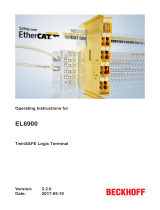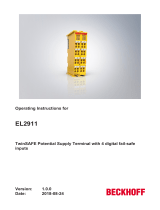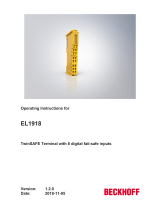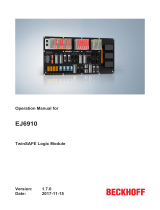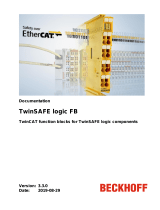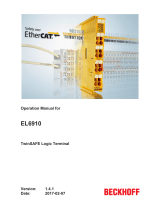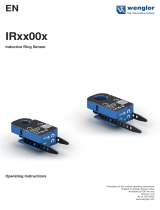Page is loading ...

Operating Instructions for
EL1904
TwinSAFE Terminal with 4 digital fail-safe inputs
2.1.1
2017-02-07
Version:
Date:


Table of contents
EL1904 3Version: 2.1.1
Table of contents
1 Foreword ....................................................................................................................................................5
1.1 Notes on the documentation........................................................................................................... 5
1.2 Safety instructions .......................................................................................................................... 6
1.2.1 Delivery state .....................................................................................................................6
1.2.2 Operator's obligation to exercise diligence ........................................................................6
1.2.3 Description of safety symbols ............................................................................................7
1.3 Documentation issue status............................................................................................................ 8
2 System description ...................................................................................................................................9
2.1 The Beckhoff Bus Terminal system ................................................................................................ 9
2.1.1 Bus Coupler .....................................................................................................................10
2.1.2 Bus Terminals ..................................................................................................................11
2.1.3 E-bus................................................................................................................................11
2.1.4 Power contacts.................................................................................................................11
2.2 TwinSAFE..................................................................................................................................... 12
2.2.1 The I/O construction kit is extended safely ......................................................................12
2.2.2 Safety concept .................................................................................................................12
2.2.3 EL1904, EL2904 - Bus Terminals with 4 fail-safe inputs or outputs ................................13
2.2.4 EL6900 - TwinSAFE logic terminal ..................................................................................13
2.2.5 The fail-safe principle (Fail Stop) .....................................................................................13
3 Product description.................................................................................................................................14
3.1 EL1904 – TwinSAFE terminal with 4 digital fail-safe inputs.......................................................... 14
3.2 Intended use ................................................................................................................................. 14
3.3 Technical data .............................................................................................................................. 16
3.4 Safety parameters ........................................................................................................................ 17
3.5 Characteristic curve of the inputs ................................................................................................. 17
3.6 Dimensions ................................................................................................................................... 18
3.7 Block diagram of the EL1904........................................................................................................ 18
4 Operation..................................................................................................................................................19
4.1 Environmental conditions.............................................................................................................. 19
4.2 Installation..................................................................................................................................... 19
4.2.1 Safety instructions............................................................................................................19
4.2.2 Transport / storage...........................................................................................................19
4.2.3 Mechanical installation.....................................................................................................19
4.2.4 Electrical installation.........................................................................................................23
4.2.5 TwinSAFE reaction times.................................................................................................29
4.2.6 Tested EL1904 devices ...................................................................................................30
4.3 Operation in potentially explosive atmospheres (ATEX) .............................................................. 31
4.3.1 Special conditions ............................................................................................................31
4.3.2 Identification.....................................................................................................................32
4.3.3 Date code and serial number...........................................................................................32
4.3.4 Further ATEX documentation ..........................................................................................32
4.4 Configuration of the terminal in TwinCAT ..................................................................................... 32
4.4.1 Inserting a Bus Coupler ...................................................................................................32
4.4.2 Inserting a Bus Terminal ..................................................................................................33
4.4.3 Inserting an EL1904.........................................................................................................33
4.4.4 Address settings on TwinSAFE terminals with 65535 possible addresses......................34
4.4.5 Entering a TwinSAFE address and parameters in the System Manager.........................35
4.5 Diagnostics ................................................................................................................................... 39

Table of contents
EL19044 Version: 2.1.1
4.5.1 Diagnostic LEDs...............................................................................................................39
4.5.2 Diagnostic objects............................................................................................................40
4.6 Maintenance ................................................................................................................................. 41
4.7 Service life .................................................................................................................................... 42
4.8 Decommissioning ......................................................................................................................... 42
5 Appendix ..................................................................................................................................................43
5.1 Support and Service ..................................................................................................................... 43
5.2 Certificates.................................................................................................................................... 44

Foreword
EL1904 5Version: 2.1.1
1 Foreword
1.1 Notes on the documentation
Intended audience
This description is only intended for the use of trained specialists in control and automation engineering who
are familiar with the applicable national standards.
It is essential that the following notes and explanations are followed when installing and commissioning
these components.
The responsible staff must ensure that the application or use of the products described satisfy all the
requirements for safety, including all the relevant laws, regulations, guidelines and standards.
Origin of the document
This documentation was originally written in German. All other languages are derived from the German
original.
Currentness
Please check whether you are using the current and valid version of this document. The current version can
be downloaded from the Beckhoff homepage at http://www.beckhoff.com/english/download/twinsafe.htm.
In case of doubt, please contact Technical Support [}43].
Product features
Only the product features specified in the current user documentation are valid. Further information given on
the product pages of the Beckhoff homepage, in emails or in other publications is not authoritative.
Disclaimer
The documentation has been prepared with care. The products described are subject to cyclical revision. For
that reason the documentation is not in every case checked for consistency with performance data,
standards or other characteristics. We reserve the right to revise and change the documentation at any time
and without prior announcement. No claims for the modification of products that have already been supplied
may be made on the basis of the data, diagrams and descriptions in this documentation.
Trademarks
Beckhoff
®
, TwinCAT
®
, EtherCAT
®
, Safety over EtherCAT
®
, TwinSAFE
®
, XFC
®
and XTS
®
are registered
trademarks of and licensed by Beckhoff Automation GmbH.
Other designations used in this publication may be trademarks whose use by third parties for their own
purposes could violate the rights of the owners.
Patent Pending
The EtherCAT Technology is covered, including but not limited to the following patent applications and
patents: EP1590927, EP1789857, DE102004044764, DE102007017835 with corresponding applications or
registrations in various other countries.
The TwinCAT Technology is covered, including but not limited to the following patent applications and
patents: EP0851348, US6167425 with corresponding applications or registrations in various other countries.

Foreword
EL19046 Version: 2.1.1
EtherCAT
®
is registered trademark and patented technology, licensed by Beckhoff Automation GmbH,
Germany
Copyright
© Beckhoff Automation GmbH & Co. KG, Germany.
The reproduction, distribution and utilization of this document as well as the communication of its contents to
others without express authorization are prohibited.
Offenders will be held liable for the payment of damages. All rights reserved in the event of the grant of a
patent, utility model or design.
Delivery conditions
In addition, the general delivery conditions of the company Beckhoff Automation GmbH & Co. KG apply.
1.2 Safety instructions
1.2.1 Delivery state
All the components are supplied in particular hardware and software configurations appropriate for the
application. Modifications to hardware or software configurations other than those described in the
documentation are not permitted, and nullify the liability of Beckhoff Automation GmbH & Co. KG.
1.2.2 Operator's obligation to exercise diligence
The operator must ensure that
• the TwinSAFE products are only used as intended (see chapter Product description);
• the TwinSAFE products are only operated in sound condition and in working order.
• the TwinSAFE products are operated only by suitably qualified and authorized personnel.
• the personnel is instructed regularly about relevant occupational safety and environmental protection
aspects, and is familiar with the operating instructions and in particular the safety instructions contained
herein.
• the operating instructions are in good condition and complete, and always available for reference at the
location where the TwinSAFE products are used.
• none of the safety and warning notes attached to the TwinSAFE products are removed, and all notes
remain legible.

Foreword
EL1904 7Version: 2.1.1
1.2.3 Description of safety symbols
In these operating instructions the following symbols are used with an accompanying safety instruction or
note. The safety instructions must be read carefully and followed without fail!
DANGER
Serious risk of injury!
Failure to follow the safety instructions associated with this symbol directly endangers the
life and health of persons.
WARNING
Risk of injury!
Failure to follow the safety instructions associated with this symbol endangers the life and
health of persons.
CAUTION
Personal injuries!
Failure to follow the safety instructions associated with this symbol can lead to injuries to
persons.
Attention
Damage to the environment or devices
Failure to follow the instructions associated with this symbol can lead to damage to the en-
vironment or equipment.
Note
Tip or pointer
This symbol indicates information that contributes to better understanding.

Foreword
EL19048 Version: 2.1.1
1.3 Documentation issue status
Version Comment
2.1.1 • Technical data permissible air pressure expanded
2.1.0 • Chapter Address settings on TwinSAFE terminals with 65535 possible addresses updated
• Links in technical data corrected
2.0.0 • Migration and structural adaptation
• Reliability document updated
• Safety parameters updated
• Foreword revised
1.5.2 • Block diagram updated
• Numbering/table of contents changed (Chapter 4.1.5 to 4.1.7)
• Description of the test pulses added
• Description of the reaction times added
• Reliability document updated
1.5.1 • Certificate updated
1.5.0 • Company address amended
• Safety parameters extended
1.4.0 • Extended temperature range added
• Temperature measurement described
• Characteristic input curve added
• Description of date code extended
1.3.1 • Document origin added
1.3.0 • Clock output currents in the technical data amended
• Block diagram for EL1904 added
1.2.1 • Reference to EN60068-2-29 removed
1.2.0 • ATEX notes amended
• Installation position / minimum distances extended
• Notes regarding overvoltage protection amended
• Notes regarding cable length and clocked signals extended
• Diagnostics for CoE object 0x800E described
1.1.0 • Minor amendments for EtherCAT
• Copyright / disclaimer modified
• Support / service addresses updated
1.0.0 • First released version

System description
EL1904 9Version: 2.1.1
2 System description
2.1 The Beckhoff Bus Terminal system
The Beckhoff Bus Terminal system is used for decentralized connection of sensors and actuators to a
control system. The Beckhoff Bus Terminal system components are mainly used in industrial automation and
building management applications. In its minimum configuration, a bus station consists of a Bus Coupler or a
Bus Terminal Controller and Bus Terminals connected to it. The Bus Coupler forms the communication
interface to the higher-level controller, and the terminals are the interface to sensors and actuators. The
whole bus station is clipped onto a 35 mm DIN mounting rail (EN 60715). The mechanical cross connection
of the bus station is established via a slot and key system at the Bus Coupler and the Bus Terminals.
The sensors and actuators are connected with the terminals via the screwless (spring-loaded) connection
system.
Fig.1: Slot and key system and screwless (spring-loaded) connection system.
In order to accommodate the wide range of different communication standards encountered in industrial
automation, Beckhoff offers Bus Couplers for a number of common bus systems (e.g. EK1100 for
EtherCAT).

System description
EL190410 Version: 2.1.1
2.1.1 Bus Coupler
Mechanical data Bus Coupler
Material polycarbonate, polyamide (PA6.6).
Dimensions (W x H x D) 44mm x 100mm x 68mm
Mounting on 35 mm mounting rail (EN60715) with locking
Attachable by double slot and key connection
Fig.2: Bus Coupler (EtherCAT)
Connection technology Bus Coupler
Wiring spring-loaded system
Connection cross-section 0.08 mm² ... 2.5 mm², stranded wire, solid wire
Fieldbus connection depending on fieldbus
Power contacts 3 spring contacts
Current load 10A
Rated voltage 24 V
DC

System description
EL1904 11Version: 2.1.1
2.1.2 Bus Terminals
Mechanical data Bus Terminal
Material polycarbonate, polyamide (PA6.6).
Dimensions (W x H x D) 12mm x 100mm x 68mm or 24mm x 100mm x 68mm
Mounting on 35 mm mounting rail (EN60715) with locking
Attachable by double slot and key connection
Fig.3: TwinSAFE Terminals (EtherCAT)
Connection technology Bus Terminal
Wiring spring-loaded system
Connection cross-section 0.08 mm² ... 2.5 mm², stranded wire, solid wire
Fieldbus connection E-bus
Power contacts up to 3 blade/spring contacts
Current load 10A
Rated voltage depends on Bus Terminal type
2.1.3 E-bus
The E-bus is the data path within a terminal strip. The E-bus is led through from the Bus Coupler through all
the terminals via six contacts on the terminals' side walls.
2.1.4 Power contacts
The operating voltage is passed on to following terminals via three power contacts. Terminal strip can be
split into galvanically isolated groups by means of potential feed terminals as required. The power feed
terminals play no part in the control of the terminals, and can be inserted at any locations within the terminal
strip.

System description
EL190412 Version: 2.1.1
2.2 TwinSAFE
2.2.1 The I/O construction kit is extended safely
With the TwinSAFE Terminals, Beckhoff offers the option of simply expanding the proven Bus Terminal
system, and to transfer the complete cabling for the safety circuit into the already existing fieldbus cable.
Safe signals can be mixed with standard signals without restriction. This saves design effort, installation and
material. Maintenance is simplified significantly through faster diagnosis and simple replacement of only a
few components.
The new ELx9xx series Bus Terminals only include three basic functionalities: digital inputs EL19xx, digital
outputs EL29xx and a logic unit EL6900. For a large number of applications, all sensors and actuators can
be wired on these Bus Terminals. The required logical link of the inputs and the outputs is handled by the
EL6900. For small to medium-sized configurations, the tasks of a fail-safe PLC can thus be handled within
the Bus Terminal system.
2.2.2 Safety concept
TwinSAFE: Safety and I/O technology in one system
• Extension of the familiar Beckhoff I/O system with TwinSAFE terminals
• Freely selectable mix of safe and standard signals
• Logical link of the I/Os in the EL6900 TwinSAFE logic terminal
• Safety-relevant networking of machines via bus systems
TwinSAFE protocol (FSoE)
• Transfer of safety-relevant data via any media (“genuine black channel”)
• TwinSAFE communication via fieldbus systems such as EtherCAT, Lightbus, PROFIBUS or Ethernet
• IEC 61508:2010 SIL 3 compliant
Configuring instead of wiring: the TwinSAFE configurator
• Configuration of the TwinSAFE system via the TwinCAT System Manager
• System Manager for editing and displaying all bus parameters
• Certified function blocks such as emergency stop, operation mode, etc.
• Simple handling
• Typical function blocks for machine safety
• any bus connection with the EL6900 TwinSAFE logic terminal
TwinSAFE logic Bus Terminal EL6900
• Link unit between TwinSAFE input and output terminals
• Configuration of a simple, flexible, cost-effective, decentralized safety controller
• No safety requirements for higher-level control system
• TwinSAFE enables networks with up to 65535 TwinSAFE devices
• TwinSAFE logic terminal can establish up to 128 connections (TwinSAFE connections).
• Several TwinSAFE logic terminals are cascadable in a network
• Safety functions such as emergency stop, protective door, etc. are already included
• Suitable for applications up to SIL 3 according to IEC 61508:2010 and
DINENISO13849-1:2006(Cat4, PLe).
TwinSAFE digital input (EL1904) and output terminal (EL2904)
• All current safety sensors can be connected

System description
EL1904 13Version: 2.1.1
• Operation with a TwinSAFE logic terminal
• EL1904 with 4 fail-safe inputs for sensors (24VDC) with floating contacts
• EL2904 with four safe channels for actuators (24VDC, 0.5 A per channel)
• Conforming to IEC 61508:2010 SIL 3 and DINENISO13849-1:2006(Cat4, PLe) requirements.
2.2.3 EL1904, EL2904 - Bus Terminals with 4 fail-safe inputs or
outputs
The EL1904 and EL2904 Bus Terminals enable connection of common safety sensors and actuators. They
are operated with the EL6900 TwinSAFE logic terminal. The TwinSAFE logic terminal is the link unit between
the TwinSAFE input and output terminals. It enables the configuration of a simple, flexible and cost-effective
decentralized safety control system.
Therefore, there are no safety requirements for the higher-level controller! The typical safety functions
required for the automation of machines, such as emergency stop, protective door, two-hand etc., are
already permanently programmed in the EL6900. The user configures the EL6900 terminal according to the
safety requirements of his application.
2.2.4 EL6900 - TwinSAFE logic terminal
The TwinSAFE logic terminal is the link unit between the TwinSAFE input and output terminals. The EL6900
meets the requirements of IEC 61508:2010 SIL 3, EN 954 Cat. 4 and DIN EN ISO 13849-1:2006 (Cat 4, PL
e).
2.2.5 The fail-safe principle (Fail Stop)
The basic rule for a safety system such as TwinSAFE is that failure of a part, a system component or the
overall system must never lead to a dangerous condition. The safe state is always the switched off and
wattless state.

Product description
EL190414 Version: 2.1.1
3 Product description
3.1 EL1904 – TwinSAFE terminal with 4 digital fail-safe
inputs
The EL1904 is a digital input terminal for encoder with floating contacts for 24V
DC
. The Bus Terminal has 4
fail-safe inputs.
With two-channel connection, the EL1904 meets the requirements of IEC 61508:2010 SIL 3, DIN EN ISO
13849-1:2006 (Cat 4, PL e), NRTL, UL508, UL1998 and UL991.
The TwinSAFE terminal has the typical design of an EtherCAT terminal.
Fig.4: EL1904 – TwinSAFE terminal with 4 digital fail-safe inputs
3.2 Intended use
WARNING
Caution - Risk of injury!
TwinSAFE components may only be used for the purposes described below!
The TwinSAFE terminals expand the application range of Beckhoff Bus Terminal system with functions that
enable them to be used for machine safety applications. The TwinSAFE terminals are designed for machine
safety functions and directly associated industrial automation tasks. They are therefore only approved for
applications with a defined fail-safe state. This safe state is the wattless state. Fail-safety according to the
relevant standards is required.
The TwinSAFE Terminals enable connection of:
• 24 V
DC
sensors (EL1904) such as
emergency off pushbutton switches, pull cord switches, position switches, two-hand switches, safety
mats, light curtains, light barriers, laser scanner, etc.

Product description
EL1904 15Version: 2.1.1
• 24 V
DC
actuators (EL2904) such as
contactors, protection door switches with tumbler, signal lamps, servo drives, etc.
Note
Test pulses
When selecting actuators please ensure that the EL2904 test pulses do not lead to actuator
switching or diagnostic message from the EL2904.
The following TwinSAFE components have been developed for these tasks:
• The EL1904 is an EtherCAT Terminal with 4 digital fail-safe inputs.
• The EL2904 is an EtherCAT Terminal with 4 digital fail-safe outputs.
• The EL6900 is an EtherCAT Terminal with integrated TwinSAFE logic.
These TwinSAFE components are suitable for operation on the
• Beckhoff EKxxxx series Bus Couplers
• Beckhoff CXxxxx series Embedded PCs with E-bus connection
WARNING
Power supply from SELV/PELV power supply unit!
The TwinSAFE components must be supplied with 24V
DC
by an SELV/PELV power supply
unit with an output voltage limit U
max
of 36V
DC
. Failure to observe this can result in a loss of
safety.
CAUTION
Follow the machinery directive!
The TwinSAFE components may only be used in machines as defined in the machinery di-
rective.
CAUTION
Ensure traceability!
The buyer has to ensure the traceability of the device via the serial number.

Product description
EL190416 Version: 2.1.1
3.3 Technical data
Product designation EL1904
Number of inputs 4
Status display 4 (one green LED per input)
Reaction time (read input/write to E-bus) typically: 4ms,
maximum: see error reaction time
Error reaction time ≤ watchdog time
Cable length between sensor and terminal unshielded max. 100 m (0.75 or 1 mm²)
shielded max. 100 m (0.75 or 1 mm²)
Output current of the clock outputs typically 10 mA, max. 15 mA
Input process image 6 bytes
Output process image 6 bytes
EL1904 supply voltage (PELV) 24V
DC
(–15%/+20%)
Signal voltage "0" inputs
-3 V to 5 V (EN61131-2, type 3) see chapter Characteristic curve
of the inputs [}17]
Signal voltage "1" inputs
11 V to 30 V (EN61131-2, type 3) see chapter Characteristic
curve of the inputs [}17]
Current consumption of the modular electronics at 24V (without cur-
rent consumption of sensors)
4 channels occupied: typically 12mA
0 channels occupied: typically 1.4 mA
Current consumption via E-bus 4 channels occupied: approx. 200 mA
Power dissipation of the terminal typically 1 W
Electrical isolation (between the channels) no
Electrical isolation (between the channels and the E-bus) yes
Insulation voltage (between the channels and the E-bus, under com-
mon operating conditions)
insulation tested with 500 V
DC
Dimensions (W x H x D) 12mm x 100mm x 68mm
Weight approx. 50 g
Permissible ambient temperature (operation)
up to SW 05
0 °C to +55 °C (see notes in chapter Example configuration for
temperature measurement [}21])
Permissible ambient temperature (operation)
from SW 06 (week 02/2014)
-25°C to +55 °C (see notes in chapter Example configuration for
temperature measurement [}21])
Permissible ambient temperature (transport/storage) -40°C to +70°C
Permissible air humidity 5% to 95%, non-condensing
Permissible air pressure (operation/storage/transport) 750hPa to 1100hPa
(this corresponds to a height of approx. -690m to 2450m over
sea level assuming an international standard atmosphere)
Climate category according to EN 60721-3-3 3K3
(the deviation from 3K3 is possible only with optimal environmen-
tal conditions and also applies only to the technical data which
are specified differently in this documentation)
Permissible level of contamination
according to EN 60664-1
level of contamination 2
(comply with the chapter Maintenance [}41])
Impermissible operating conditions TwinSAFE terminals must not be used under the following oper-
ating conditions:
• under the influence of ionizing radiation (that exceeds the
level of the natural environmental radiation)
• in corrosive environments
• in an environment that leads to unacceptable soiling of
the Bus Terminal
EMC immunity/emission conforms to EN 61000-6-2 / EN 61000-6-4
Vibration/shock resistance conforms to EN 60068-2-6 / EN 60068-2-27
Shocks 15 g with pulse duration 11 ms in all three axes
Protection class IP20
Permitted operating environment In the control cabinet or terminal box, with minimum protection
class IP54 according to IEC60529
Permissible installation position
see chapter Installation position and minimum distances [}20]
Approvals CE, cULus, ATEX, TÜV SÜD

Product description
EL1904 17Version: 2.1.1
3.4 Safety parameters
Key figures EL1904
Lifetime [a] 20
Prooftest Interval [a] not required
1
PFH
D
1.11E-09
%SIL3 1.11%
PFD 8.29E-05
%SIL3 8.29%
MTTF
d
high
DC high
Performance level PL e
Category 4
HFT 1
Element classification
2
Type B
1. Special proof tests are not required during the entire service life of the EL1904 EtherCAT terminal.
2. Classification according to IEC61508-2:2010 (chapter 7.4.4.1.2 and 7.4.4.1.3)
The EL1904 EtherCAT Terminal can be used for safety-related applications within the meaning of
IEC61508:2010 up to SIL3 and ENISO13849-1 up to PLe(Cat4).
For the calculation or estimation of the MTTF
d
value from the PFH
D
value, further information can be found in
the TwinSAFE application guide or in ISO 13849-1:2015 Table K.1.
3.5 Characteristic curve of the inputs
The characteristic curve of the inputs is similar to type 3 according to EN 61131-2.
Fig.5: Characteristic curve of the inputs

Product description
EL190418 Version: 2.1.1
3.6 Dimensions
Fig.6: Dimensions of the EL1904
Width: 12 mm (side-by-side installation)
Height: 100mm
Depth: 68mm
3.7 Block diagram of the EL1904
Fig.7: Block diagram of the EL1904
The block diagram shows the basic configuration of a channel in the EL1904. The part with a red border is
present four times in the terminal.

Operation
EL1904 19Version: 2.1.1
4 Operation
4.1 Environmental conditions
Please ensure that the TwinSAFE components are only transported, stored and operated under the specified
conditions (see technical data)!
WARNING
Risk of injury!
The TwinSAFE components must not be used under the following operating conditions.
• under the influence of ionizing radiation (that exceeds the level of the natural environ-
mental radiation)
• in corrosive environments
• in an environment that leads to unacceptable soiling of the TwinSAFE component
Attention
Electromagnetic compatibility
The TwinSAFE components comply with the current standards on electromagnetic compat-
ibility with regard to spurious radiation and immunity to interference in particular.
However, in cases where devices such as mobile phones, radio equipment, transmitters or
high-frequency systems that exceed the interference emissions limits specified in the stan-
dards are operated near TwinSAFE components, the function of the TwinSAFE compo-
nents may be impaired.
4.2 Installation
4.2.1 Safety instructions
Before installing and commissioning the TwinSAFE components please read the safety instructions in the
foreword of this documentation.
4.2.2 Transport / storage
Use the original packaging in which the components were delivered for transporting and storing the
TwinSAFE components.
CAUTION
Note the specified environmental conditions
Please ensure that the digital TwinSAFE components are only transported and stored un-
der the specified environmental conditions (see technical data).
4.2.3 Mechanical installation
DANGER
Risk of injury!
Bring the bus system into a safe, de-energized state before starting installation, disassem-
bly or wiring of the devices!
4.2.3.1 Control cabinet / terminal box
The TwinSAFE terminals must be installed in a control cabinet or terminal box with IP54 protection class
according to IEC60529 as a minimum.

Operation
EL190420 Version: 2.1.1
4.2.3.2 Installation position and minimum distances
For the prescribed installation position the mounting rail is installed horizontally and the mating surfaces of
the EL/KL terminals point toward the front (see illustration below). The terminals are ventilated from below,
which enables optimum cooling of the electronics through convection. The direction indication “down”
corresponds to the direction of positive acceleration due to gravity.
Fig.8: Installation position and minimum distances
In order to ensure optimum convection cooling, the distances to neighboring devices and to control cabinet
walls must not be smaller than those shown in the diagram.
/
